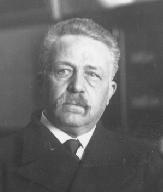Gaetano Mosca | |
|---|---|
 | |
| Member of the Italian Chamber of Deputies for Palermo | |
| In office 24 March 1909 – 29 September 1919 | |
| Constituency | Caccamo |
| Personal details | |
| Born | 1 April 1858 Palermo, Kingdom of the Two Sicilies |
| Died | 8 November 1941 (aged 83) Rome, Italy |
| Political party | Historical Right |
| Alma mater | University of Palermo |
| Profession | Teacher, journalist |
Philosophy career | |
| Era | 20th-century philosophy |
| Region | Western philosophy |
| School | Italian school of elitism |
Main interests | Politics, economics, sociology |
Notable ideas | Political class, political formula (a set of doctrines propagated by the ruling elites),[1] elite theory |
|
Preview warning: Page using Template:Infobox philosopher with unknown parameter "influenced" Preview warning: Page using Template:Infobox philosopher with unknown parameter "influences" | |
Gaetano Mosca COSML COCI SoK (Italian pronunciation: [ɡaeˈtaːno ˈmoska]; 1 April 1858 – 8 November 1941) was an Italian political scientist, journalist and public servant. He is credited with developing the elite theory and the doctrine of the political class and is one of the three members constituting the Italian school of elitism together with Vilfredo Pareto and Robert Michels.[2][3]